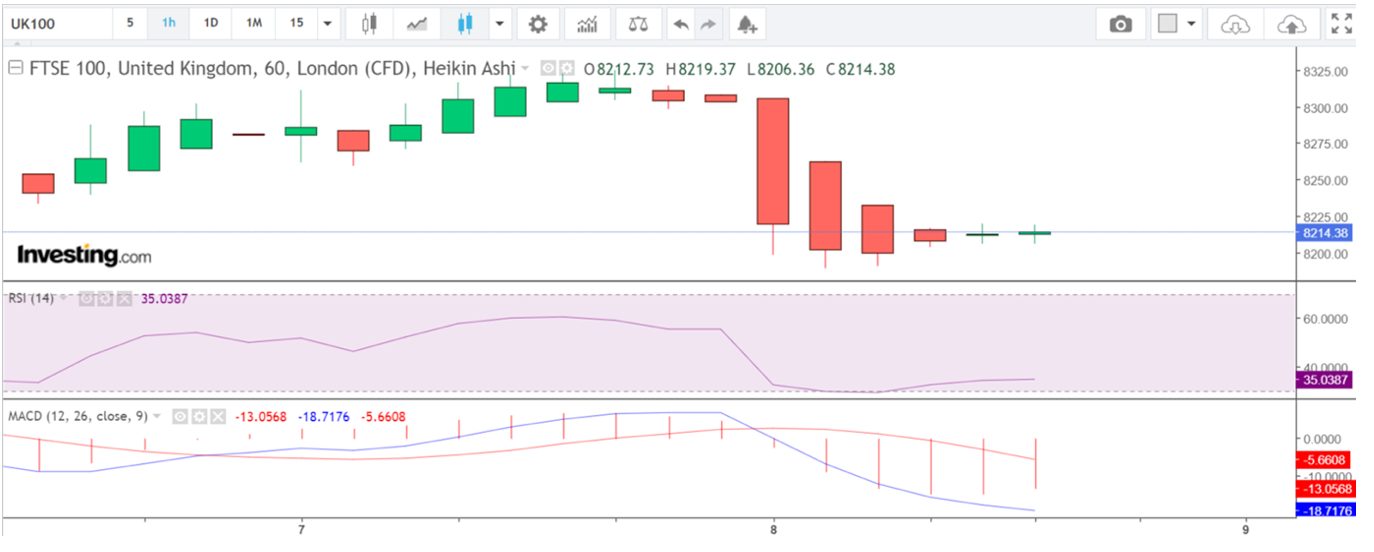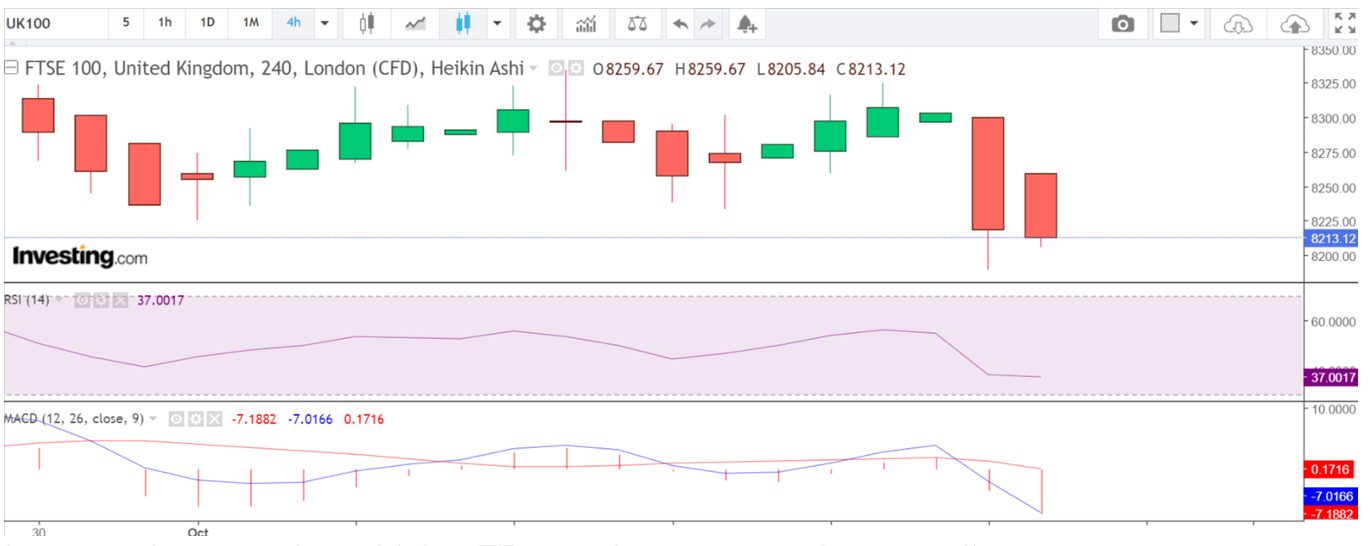CFD Trading in the UK



Looking to place short-term trades on financial markets like British stocks without owning them? Enter contracts for difference (CFDs), which allow you to speculate on rising and falling prices using leverage to amplify results.
The UK was the birthplace of CFDs, which were developed in the early 1990s for institutional use, primarily for hedging. They were introduced to the retail market in the late 1990s and boomed in popularity.
CFDs remain popular today but are subject to stricter rules from the Financial Conduct Authority (FCA), notably leverage limits, standardized risk warnings, and automatic margin closeouts.
This guide to CFD trading in the UK unpacks the basics, from regulations, taxes, and risks to an example trade.
Quick Introduction
- CFDs facilitate trading on various UK and global markets, including stocks, indices, and currencies. You go “long” (buy) if you expect prices to rise or “short” (sell) if you expect a fall.
- Through leverage, which is capped at 1:30 for retail investors in the UK, you can trade larger positions with less capital, magnifying gains and losses, making risk management vital.
- Unlike physical stock trading, CFDs don’t involve ownership of the underlying asset, so in the UK, traders are exempt from stamp duty. However, capital gains tax may still apply.
- CFD trading is legal but tightly regulated by the UK’s FCA – a ‘green tier’ body in DayTrading.com’s Regulation & Trust Rating, ensuring robust protections for retail investors.
Best CFD Brokers in the UK
After hands-on tests by our British traders and experts, these are our 4 top picks for CFD traders in the UK:
How Does CFD Trading Work?
CFD trading gives you access to financial markets without the added capital investment needed to own actual assets.
Leverage is one of the most attractive elements of CFDs because it lets you open large positions while committing a fraction of the total value or margin needed to, for example, buy the equivalent amount of shares.
To show you how it works, let’s look at a potential trading scenario using the FTSE 100 Index.
If you believe the FTSE 100 will rise, you could enter a CFD buy position. If each contract is valued at GBP 8,200 (roughly the index price), and your brokerage requires a 5% margin, then to take a position on 10 contracts, your margin requirement would be GBP 4,100 (8,200 per contract x 10 contracts x 5%).
If the Footsie rises to 8,300, the price increase would yield GBP 100 per contract. By closing your position, you could secure a total profit of GBP 1,000 (10 contracts x GBP 100), excluding any fees your broker charges.
Equally, if the index falls to GBP 8,100, you would lose GBP 1,000, highlighting the risks involved with CFD trading; losses and gains are magnified.
Understanding how margin requirements and leverage work is critical.If you’re new to CFD trading, a demo account provides an excellent introduction to build confidence before risking real money.
What Can I Trade?
CFDs deliver a wealth of trading opportunities across many financial markets, both in the UK and globally:
- Stock CFDs – You can trade individual UK company stocks listed on the London Stock Exchange. These highly liquid firms can be traded as CFDs without the added expense you’d incur if you bought the shares.
- Index CFDs – Referred to as “Footsie,” the FTSE is the UK’s leading stock market index of the 100 most capitalized blue chips listed on the London Stock Exchange. Traders often choose index CFDs to speculate on the UK market’s overall performance rather than trade individual shares. You can also explore index CFDs on major global indices across the pond like the Dow Jones or the NASDAQ.
- Forex CFDs – The UK pound is actively traded in the foreign exchange market. Popular currency pairs include GBP/USD and EUR/GBP. These pairs provide liquidity and opportunities for short-term traders, especially GBP/USD, one of the most traded currency pairs worldwide.
- Commodity CFDs – Key commodities like oil, given the UK’s major north sea operations, or gold due to its role as a ‘safe haven’ asset, can be traded as CFDs, allowing you to speculate on the price movements of essential global resources.
The FCA banned the sale of crypto CFDs to retail investors in 2021 due to concerns about excessive market volatility, significant risks, and unscrupulous actors.
Is CFD Trading Legal In The UK?
CFD trading is legal in the UK but strictly controlled by the Financial Conduct Authority (FCA).
The FCA sets rules to ensure brokers offering CFDs operate fairly, protecting retail traders from excessive risk, especially when using leverage:
- Leverage is limited based on asset volatility, up to 1:30 for major currency pairs like GBP/USD.
- Negative balance protection ensures retail clients cannot lose more than their initial investment.
- Brokers are no longer allowed to offer bonuses and promotions to entice Brits to trade.
- Firms must provide clear risk warnings about the potential losses in CFD trading.
- Positions will be automatically closed when a client’s equity falls below a threshold (typically 50% of margin).
- Brokers should provide clear information about the fees associated with CFD trading.
Over the years, the FCA has stepped up its oversight of the industry due to concerns about the risks of trading CFDs. It has issued various warnings to retail investors and cracked down on unauthorized providers, including the now notorious EverFX.
Is CFD Trading Taxed In The UK?
CFD trading is taxed in the UK, but the type of tax depends on your trading activities and status.
Profits from CFD trading are generally subject to Capital Gains Tax (CGT), as CFDs are considered a form of investment. You may need to pay CGT to the UK Revenue and Customs on your profits if your total gains from all assets (including CFDs) exceed the annual tax-free allowance.
The CGT rate is 10% for basic-rate taxpayers and 20% for higher and additional-rate taxpayers.
One of the advantages of CFD trading is that you don’t own the underlying asset. As a result, no stamp duty is charged on CFD trades, unlike when buying shares directly.
If CFD trading is your primary source of income or if you trade frequently and at high volumes, HMRC may classify you as a professional trader. In this case, your profits could be taxed as income instead of capital gains. Income tax rates are higher than CGT, ranging from 20% to 45%, depending on your tax bracket.
It’s important to keep accurate records of your trades and consult a tax advisor in the UK to ensure compliance with the latest tax regulations, especially if you trade frequently or generate significant profits from CFDs.
A Trade In Action
I’m a UK trader that’s actively dealt in CFDs over the years. To show you how CFD trading in the UK works in practice, let’s walk through a trade from start to finish.
I’m trading the FTSE 100. Due to its liquidity and popularity, I can trade it 24/5 as a CFD on many platforms and be sure of accurate fills and reasonable costs, such as spreads and commissions.
Fundamentals
When trading an index, I focus more on my economic calendar and news to gauge the fundamental landscape, concentrating on metrics published or about to be published relating to the UK’s economic performance. For example, unemployment, inflation, GDP growth, government borrowing and debt, etc.
I’ll also keep a weather-eye on international market indices and global macroeconomic data because if the USA SPX500 or NAS100 falls, then the UK FTSE generally follows suit.
Technical Analysis
When trading indices, I’ll still use trusted technical indicators that also work well when trading currency pairs, individual stocks, and commodities.
So, the MACD and RSI are my go-to technical indicators (TIs), especially when combined with Heikin Ashi (HA) candlesticks/bars to illustrate price action.
It’s worth stressing that you should avoid overcomplicating when technical analysis and indicators are involved. You need to make quick decisions, especially when markets are opening in the UK, Europe, and the USA.If you have too many indicators or your charts light up like Christmas trees, you could overanalyse, leading to confusion and indecision.
Don’t forget that as a day trader, you’re looking for most indicators, including Heikin Ashi (HA), to quickly illustrate prices rising or falling, so a combination that’ll rapidly identify a reason to get in or out and adjust your trailing stop is all you need.
Try selecting a combination of indicators that show you trading volume, volatility, momentum, turning points, and a trend on whatever timeframes you prefer.
1 Hour Timeframe
In the chart below, the Heikin Ashi candlestick pattern clearly illustrates a balance between buyers and sellers, indicated by a bullish Doji, followed by price printing lower highs on two 1HR bars.
What follows is an immediate reversal to bearish conditions; the MACD moving averages cross as the histogram turns bearish, and the RSI breaches the 50 median line as it races towards the 30 level, often indicating an oversold security.
The three single 1HR HA candlestick formation is a bearish textbook pattern displaying full bearish candles and small shadows (wicks).

4 Hour Timeframe
I use one lower and one higher timeframe, one short-term and one medium-term, to support my decision-making.
In this situation, I used 1HR and 4HR because I was only interested in a day trade – opening the trade during the morning session and looking to close depending on the sentiment that emerged once the US markets opened and closing when the UK markets closed at 4 PM (UK time).

Execution
I entered this short (sell) index CFD trade at 8263, setting my stop-loss order at 8,300 (which was a recent high).
I risked a small percentage of my account size on this trade, and I only needed to use 5% of my account’s margin with this CFD trade, effectively using 1:20 leverage. Buying the equivalent of 10 CFD contracts required 10 x 8,263 x 5%, which equals risking GBP 4,131.
I closed the trade at 8,215 shortly after the US markets opened, banking a GBP 480 profit before accounting for my broker’s costs and commissions. It’s worth noting that had I wanted to buy the shares, I’d have needed to part with a total GBP of 82,630.
Bottom Line
CFD trading in the UK gives you a flexible way to trade a wide range of British and global markets without owning the actual assets.
With the ability to profit from rising and falling prices and benefits like leverage, it’s no wonder why so many traders are drawn to it. However, with these rewards come significant risks, mainly due to the potential for larger losses with leverage. Only risk what you can afford to lose.
While CFD trading is legal and regulated by the FCA, it’s not without its complexities – especially when it comes to taxes and managing risk. So make sure to understand the rules, choose a reputable broker, and have a solid strategy in place.
To get started, turn to DayTrading.com’s pick of the best CFD trading providers in the UK.
Recommended Reading
Article Sources
- Financial Conduct Authority (FCA)
- FTSE 100 Index - LSE
- Stamp Duty Exemption - LSE
- Economic Calendar - Eightcap
- Crypto CFDs Banned in the UK - FCA
- Continued Concerns About CFD Firms - FCA
- EverFX Banned From Providing CFDs in the UK - FCA
The writing and editorial team at DayTrading.com use credible sources to support their work. These include government agencies, white papers, research institutes, and engagement with industry professionals. Content is written free from bias and is fact-checked where appropriate. Learn more about why you can trust DayTrading.com



